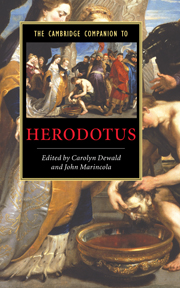Book contents
- Frontmatter
- Introduction
- 1 Herodotus and the poetry of the past
- 2 Herodotus and his prose predecessors
- 3 Herodotus and tragedy
- 4 The intellectual milieu of Herodotus
- 5 Meta-historiē: Method and genre in the Histories
- 6 The syntax of historiē: How Herodotus writes
- 7 Speech and narrative in the Histories
- 8 Herodotus, Sophocles and the woman who wanted her brother saved
- 9 Stories and storytelling in the Histories
- 10 Humour and danger in Herodotus
- 11 Location and dislocation in Herodotus
- 12 Herodotus and the natural world
- 13 Herodotus and Greek religion
- 14 Warfare in Herodotus
- 15 Herodotus, political history and political thought
- 16 Herodotus and the cities of mainland Greece
- 17 An alternate world: Herodotus and Italy
- 18 Herodotus and Persia
- 19 Herodotus and foreign lands
- 20 Herodotus' influence in antiquity
- Glossary
- Timeline
- Bibliography
- Index
- Series List
15 - Herodotus, political history and political thought
Published online by Cambridge University Press: 28 January 2007
- Frontmatter
- Introduction
- 1 Herodotus and the poetry of the past
- 2 Herodotus and his prose predecessors
- 3 Herodotus and tragedy
- 4 The intellectual milieu of Herodotus
- 5 Meta-historiē: Method and genre in the Histories
- 6 The syntax of historiē: How Herodotus writes
- 7 Speech and narrative in the Histories
- 8 Herodotus, Sophocles and the woman who wanted her brother saved
- 9 Stories and storytelling in the Histories
- 10 Humour and danger in Herodotus
- 11 Location and dislocation in Herodotus
- 12 Herodotus and the natural world
- 13 Herodotus and Greek religion
- 14 Warfare in Herodotus
- 15 Herodotus, political history and political thought
- 16 Herodotus and the cities of mainland Greece
- 17 An alternate world: Herodotus and Italy
- 18 Herodotus and Persia
- 19 Herodotus and foreign lands
- 20 Herodotus' influence in antiquity
- Glossary
- Timeline
- Bibliography
- Index
- Series List
Summary
The Ethiopians have customs which are different from all other men, especially concerning their rulers. For they choose as king the person among the citizens who is biggest and strongest.
(3.20.2)Observations about the political practices of Greeks and non-Greeks such as the one in the epigraph above were once taken as indicative of Herodotus' interest in the odd or unusual features of societies, rather than the systematic analysis of politics. According to this view, Herodotus was a naïive storyteller who had no deep of understanding of (or interest in) politics. The prime example of Herodotus' alleged lack of understanding of politics is his statement that the Athenian statesman Cleisthenes was imitating his grandfather Cleisthenes, tyrant of Sicyon, when he enacted the tribal reforms which were central to the founding of the democracy at Athens (5.67.1). Rather than recording the details of Cleisthenes' groundbreaking reforms as modern historians might wish, Herodotus mentions only the creation of new tribal divisions and 'digresses' on a similar change in tribal names made by Cleisthenes' grandfather, tyrant of Sicyon. Victor Ehrenburg, commenting on this passage in 1950, states emphatically that Herodotus 'had no discriminating knowledge of political and constitutional issues'.
The last twenty years, however, have witnessed a reversal of this negative view of Herodotus' political understanding. Herodotus is now seen as deeply embedded in the intellectual milieu of the late fifth century, and consequently well-versed in the political debates of his time. Furthermore, Herodotus is now considered not simply a teller of tales about the marvellous, but rather a skilled narrator who, through careful construction of thematic and verbal patterns, expressed views on some of the most pressing political issues of his day. Finally, rather than being seen as inadequately discriminating in his accounts of political history when compared to the contemporary Athenian historian and shrewd political analyst, Thucydides, Herodotus is now credited with a much broader conception, and hence by current standards, much more satisfying view of politics than Thucydides.
- Type
- Chapter
- Information
- The Cambridge Companion to Herodotus , pp. 224 - 241Publisher: Cambridge University PressPrint publication year: 2006
- 35
- Cited by

